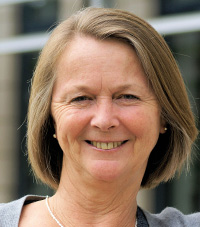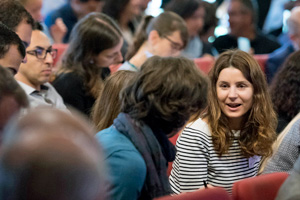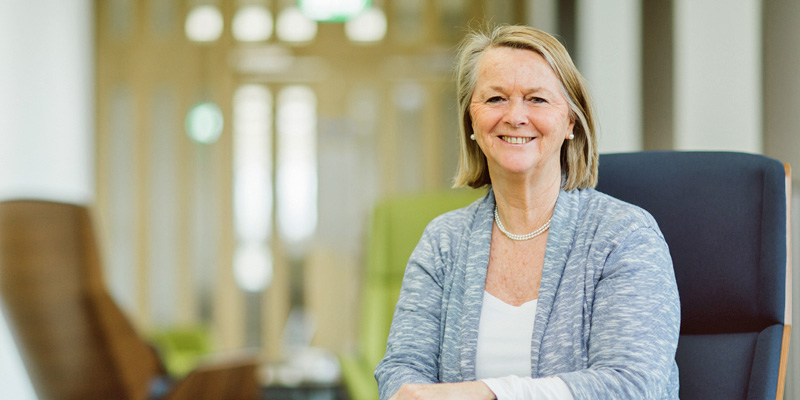Heather Laurie is a professor of sociology and Pro-Vice-Chancellor (Research) at the University of Essex. She is responsible for developing the university’s research strategy and for ensuring its effective implementation. In June 2016, the university was commended by union members for what is believed to be the first direct action of its kind to address gender pay disparity by giving female staff one-off pay rises.

“…Supported by our University Council, we took the decision to close that gap with a one-off uplift of female professors’ salaries. This sent a very powerful message within the university and across the sector that we were prepared to back up our ambitions to promote gender equality with hard cash…”
A passion for social research: Examining the inequalities and challenges women find combining paid work and family life
Since gaining my first degree and then my Ph.D. I have always been passionate about social research and the insights we can gain from analysing how society works and how all our lives are affected both by social structures and by our own attitudes and behaviours. Sociology is fundamentally concerned with investigating how society operates, and understanding the drivers of social inequalities and social change.
Before taking on my current role I was a researcher for many years and then became director of the Institute for Social and Economic Research at the University of Essex working on large scale surveys that follow people’s lives over time to track the dynamics of change. Over the last half century, we have seen enormous changes in attitudes towards women’s employment with more women than ever being active in the labour market even though still mainly in part-time employment.
This doesn’t mean we have achieved gender equality yet of course. My own research looks at the inequalities and challenges women still face in combining paid work with family life and how women’s careers develop across the course of life, and there is much evidence that we have some way to go to achieve equality.
A stimulating and challenging role

I am a member of the senior management team for the university but also carry out my own research as well as providing research leadership to others. Having a busy senior role is both challenging and stimulating of course. In common with the experience of many women, having combined bringing up young children with building a career I feel this equips me well for managing the dual aspects of my current role.
Championing gender balance in academia
It is the case that the majority of senior academics are men, with only around a quarter of professors being female even though the gender balance varies across disciplines. This is a major issue for the sector and the reasons for the imbalance are complex. At Essex, we work hard to ensure that gender equality is central in our appointment and promotion processes. We make certain women are supported and encouraged to put themselves forward and to take advantage of continuing professional development opportunities.
Personally, I have found that sometimes women do not recognise the value of their own skills but with some encouragement and support they will put themselves forward, and then go on to do a fantastic job. At Essex, we are unusual in having a senior team that has equal gender representation and a Vice-Chancellor who is absolutely committed to developing women’s careers at senior level. I think this is essential to make change happen.
Closing the gender pay gap for academic staff

This sent a very powerful message within the university and across the sector that we were prepared to back up our ambitions to promote gender equality with hard cash. I am very proud to be working for an institution that was prepared to take such a positive measure and provide an example for others to follow.
Using the Athena SWAN Charter to help face up to some difficult issues
Athena SWAN has been very important in making us face up to some difficult issues and take action. It is certainly the case that women are under-represented in science and STEM subjects, and the widening of the charter to look at gender equality across all disciplines and types of roles within the HE sector has meant that institutions have bought into the process more fully. To succeed in making real changes in advancing women’s careers institutional level support is critical, and Athena SWAN has provided an impetus and focus for much of that work.
Our staff both male and female have been very supportive of all the initiatives we have taken to promote gender equality. I think the key is having the right messages coming from the senior management team so that staff know we are all fully committed to achieving our aims. Having women in senior positions to act as role models has also been essential to demonstrate it is not just fine words but is backed up in reality.
Doing the right thing pays dividends
I would encourage all universities and other organisations to follow our lead. It can be difficult to convince an organisation that taking positive action is the right thing to do, especially where money is concerned. We have found that our actions have demonstrated we will uphold the values of the university in a very concrete way and this is paying dividends in staff loyalty, job satisfaction and willingness to go the extra mile for the organisation.
Keeping gender equality at the top of the agenda

For myself, I am sure I will be kept very busy over the next few years in my current role and will be doing all I can to promote the exciting world-class research being done at Essex by all our academics – female and male.
https://www.iser.essex.ac.uk/people/laurh
https://twitter.com/essexsociology
https://twitter.com/Uni_of_Essex
https://www.facebook.com/uniofessex/





